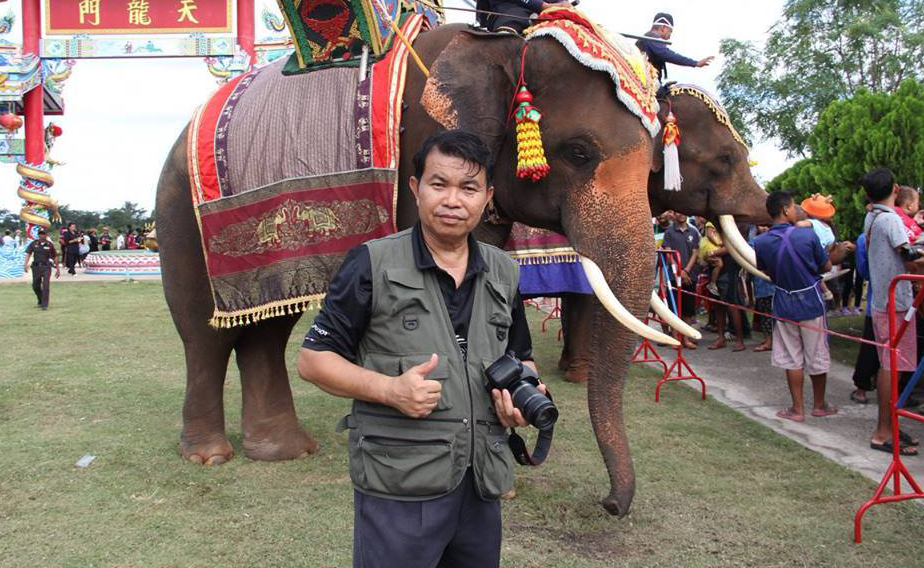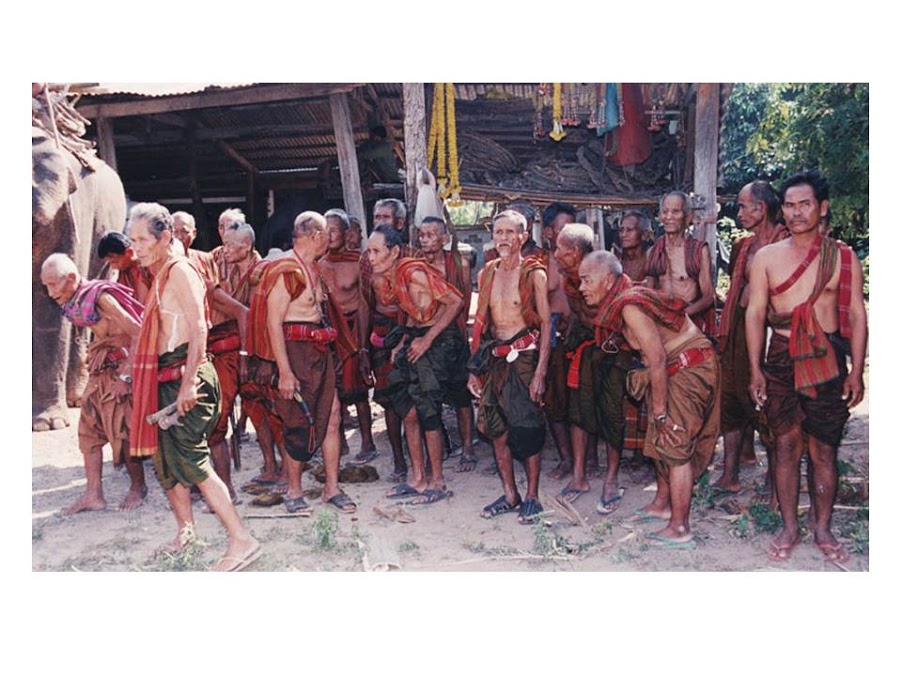
|
สุวัฒน์ อุ่นทานนท์ : ภูมิปัญญาช้างบ้านในนิเวศวิทยาวัฒนธรรมพนมดงรัก-เซเปียน LOCAL WISDOM OF DOMESTIC ELEPHANTS IN PHANOM DONGREK-XEPIAN CULTURAL ECOLOGY สาขาวิชายุทธศาสตร์การพัฒนาภูมิภาค (การศึกษาและจัดการภูมิปัญญา) มหาวิทยาลัยราชภัฏสุรินทร์ ปีการศึกษา 2553 อาจารย์ที่ปรึกษา : ศาสตราจารย์ ดร.สุจริต เพียรชอบ รองศาสตราจารย์ ดร.อัจฉรา ภาณุรัตน์ และ ดร.กรรณิการ์ จินากูล 550 หน้า
การวิจัยเรื่อง ภูมิปัญญาช้างบ้านในนิเวศวิทยาวัฒนธรรมพนมดงรัก-เซเปียน มีวัตถุประสงค์ (1) เพื่อศึกษาภูมิปัญญาช้างบ้านในนิเวศวิทยาวัฒนธรรมพนมดงรักของไทยและเซเปียนของสาธารณรัฐประชาธิปไตยประชาชนลาว (2) เพื่อวิเคราะห์องค์ประกอบที่เกี่ยวข้องกับ ภูมิปัญญาช้างบ้านในนิเวศวิทยาวัฒนธรรมพนมดงรัก ประเทศไทย และ (3) เพื่อเสนอเชิงนโยบาย ในการอนุรักษ์ภูมิปัญญาช้างบ้านในนิเวศวิทยาวัฒนธรรมพนมดงรัก ประเทศไทย ดำเนินการวิจัยด้วยการผสานวิธีวิทยาการวิจัยเชิงคุณภาพและเชิงปริมาณ โดยอาศัยเทคนิคการวิจัยแนวชาติพันธุ์วรรณนา การสนทนากลุ่มร่วมกับการวิเคราะห์ทางสถิติด้วยเทคนิคการวิเคราะห์องค์ประกอบเชิงสำรวจและการถดถอยพหุคูณแบบขั้นตอน
ผลการวิจัยพบว่า ภูมิปัญญาช้างบ้านในนิเวศวิทยาวัฒนธรรมพนมดงรัก-เซเปียน ประกอบด้วย (1) ภูมิปัญญาการคล้องช้างใช้วิธีการโพนช้าง เส้นทางการคล้องช้างอยู่ตามแนวเทือกเขาพนมดงรัก อัตปือและรัตนคีรี การเตรียมตัวไปคล้องช้างหมอและมะช้างจะไปกับครูบาใหญ่ (ติญาย)ที่ตนเองนับถือ กำหนดนัดหมายวันเวลา จัดเตรียมอุปกรณ์และเสบียงอาหารไปคล้องช้าง ทำพิธีเซ่นไหว้ผีปะกำที่บ้านและที่เป็นจุดรวมนอกบ้าน ทำพิธีกินฮีต และทำพิธีปะชิหมอช้าง (บวชหมอช้าง) เพื่อเลื่อนตำแหน่งให้เป็นหมอช้าง ครอบครัวที่ออกไปคล้องช้างต้องถือปฏิบัติโดยเคร่งครัด การเคลื่อนขบวนคาราวานช้างต่อไปยังแหล่งคล้องช้าง ใช้เวลาในการเดินทาง 10-20 วัน ถึงจุดพัก (จังรม) ทำพิธีเบิกป่าและสำรวจแหล่งช้างป่า เมื่อพบโขลงช้างป่า ได้มีการวางแผนในการคล้องช้างป่า หลังจากคล้องช้างป่าได้ ทำพิธีปัดรังควานช้าง (ปะสะ) เมื่อเสบียงอาหารหมดหรือคล้องช้างป่าได้ตามระยะเวลาที่กำหนด ได้ทำพิธีลาป่าและพิธีออกจากปะกำ เมื่อเดินทางกลับถึงบ้านได้ทำพิธีเซ่นผีปะกำและแบ่งส่วนช้างป่าที่คล้องได้ ภาษาที่ใช้ในการออกไปคล้องช้างป่าใช้ภาษาผีปะกำในการสื่อสารกัน ศาลปะกำมีความเชื่อว่าเป็นสิ่งศักดิ์สิทธิ์ที่สิงสถิตของผีบรรพบุรุษและเจ้าป่า บทบาทของหมอช้างในอดีตจนถึงปัจจุบัน จึงเป็นบุคคลที่ทรงภูมิปัญญาในชุมชน (2) ภูมิปัญญาการฝึกและเลี้ยงช้างบ้าน ช้างป่าที่คล้องมาได้ทำพิธีปัดรังควานช้างป่าให้เป็นช้างบ้านและสู่ขวัญช้าง การฝึกช้างได้ใส่ปลอกขาช้างเพื่อบังคับช้าง ใช้วิธีการฝึกโดยการสัมผัสร่วมกับคำสั่งในการฝึกและอุปกรณ์บังคับช้างเข้าช่วย การเลี้ยงช้างได้ปล่อยตามธรรมชาติและล่ามโซ่ ให้ช้าง หาอาหารกินเองในธรรมชาติและจัดหาอาหารให้ช้างกิน จัดที่อยู่อาศัยให้ช้างอยู่อาศัยตามธรรมชาติ การเลี้ยงช้างบ้านเป็นหน้าที่ของทุกคนในครอบครัวต้อง ช่วยกันเลี้ยงและดูแลเหมือนสมาชิกคนหนึ่งในครอบครัว ควาญช้างรุ่นใหม่เรียนรู้วิธีการฝึกและเลี้ยงช้างบ้านจากครอบครัว หมอช้าง ผู้ทรงภูมิปัญญา นักวิชาการและเรียนรู้ด้วยตนเองและ (3) ระบบนิเวศแหล่งช้างบ้าน ชุมชนที่มี การเลี้ยงช้างได้ปรับเปลี่ยนการเลี้ยงจากอดีต โดยนำช้างมาใช้ในการส่งเสริมการท่องเที่ยวและร่วมพิธีกรรมต่าง ๆ ตลอดจนการหารายได้จากช้างเป็นหลัก ระบบนิเวศแหล่งช้างบ้านมี ความอุดมสมบูรณ์ลดน้อยลง สภาพของระบบนิเวศสำหรับช้างถูกทำลายและมีการบุกรุกพื้นที่ป่าธรรมชาติ เพื่อให้ช้างสามารถดำรงชีวิตอยู่ในระบบนิเวศร่วมกับคน มีการส่งเสริมสนับสนุนการรักษาพื้นที่ป่าไม้ พื้นที่ชุ่มน้ำ ป่าบุ่งป่าทาม การสร้างแหล่งอาหารช้าง จัดหาแหล่งน้ำและตรวจดูแลสุขภาพช้าง นอกจากนี้ยังมีการอนุรักษ์ภูมิปัญญาช้างบ้านโดยมีเจ้าของช้าง หมอช้าง ควาญช้าง ผู้นำชุมชน ผู้นำทางภูมิปัญญา นักวิชาการ ตลอดจนหน่วยงานภาครัฐและเอกชนได้เข้ามาช่วยเหลือสนับสนุน
นอกจากนี้ จากการศึกษาเชิงปริมาณ เกี่ยวกับนิเวศวิทยาวัฒนธรรมพนมดงรัก ประเทศไทย ยังพบว่าปัจจัยที่เกี่ยวข้องกับภูมิปัญญาช้างบ้านมี 5 องค์ประกอบ ดังนี้ (1) วิธีการเลี้ยงช้าง (2) การคล้องช้างป่า (3)ระบบนิเวศช้างบ้าน (4) การส่งเสริมการเลี้ยงช้าง (5) การสร้างโลกใหม่ ให้ช้าง ผลการศึกษาในครั้งนี้ได้ข้อเสนอเชิงนโยบายในการอนุรักษ์ภูมิปัญญาช้างบ้านในนิเวศวิทยาวัฒนธรรมพนมดงรักสี่ประการคือ การส่งเสริมและสนับสนุนการให้ความรู้เทคนิควิธีการเลี้ยง ช้างบ้าน การส่งเสริมให้มีการสร้างโลกใหม่ให้ช้าง การส่งเสริมการดูแลระบบนิเวศช้างบ้านและการส่งเสริมให้มีการเลี้ยงช้างโดยการสนับสนุนและมีส่วนร่วมของชุมชนและองค์กรต่าง ๆ นโยบายเหล่านี้คงจะเป็นประโยชน์ต่อการส่งเสริมและอนุรักษ์ภูมิปัญญาช้างบ้านในนิเวศวิทยาวัฒนธรรมพนมดงรัก ประเทศไทย รวมทั้งเป็นประโยชน์ต่อการวางแผนส่งเสริมอนุรักษ์ภูมิปัญญาช้างบ้านในนิเวศวิทยาวัฒนธรรมอื่น ๆ ต่อไป
|

|
SUWAT UNTHANON : LOCAL WISDOM OF DOMESTIC ELEPHANTS IN PHANOM DONGREK-XEPIAN CULTURAL ECOLOGY DOCTOR OF PHILOSOPHY (REGIONAL DEVELOPMENT STRATEGIES) SURINDRA RAJABHAT UNIVERSITY, ACADEMIC YEAR 2010 THESIS ADVISOR : PROFESSOR DR. SUIJARIT PIANCHOP, ASSOCIATE PROFESSOR DR. ACHARA PHANURAT AND DR.KANNIKAR JINAKUL 550 P.
The research on Local Wisdom of Domestic Elephants in Phanom Dongrek – Xepian Cultural Ecology had the purposes : 1)to study local wisdom of domestic elephants in Phanom Dongrek of Thai and Xepian of Lao PDR, 2) to analyze factors relating to local wisdom of domestic elephants in Phanom Dongrek of Thailand and 3) to suggest on the policy in conservation of local wisdom of domestic elephants in Phanom Dongrek, Thailand, conducting through the integrated qualitative and the quantitative method, based on the ethnographic research technique, the focus group, as well as the exploratory factor analysis and the stepwise regression analysis
The research results on local wisdom of domestic elephants in Phanom Dongrek Xepian cultural ecology included 1) The elephant round-up wisdom, it was done through the elephant “Phone” method. The elephant round-up track lined along Phanom Dongrek, Attapue, and Ratanakhiri ranges. In preparation for the elephant round- up the elephant experts and helpers would go with their great teachers (Ti Yai) respected by them, set the time and date, prepare devices and food stuffs, pay respect to the home spirits at home to say good-bye (Pa Kam) and the gathering place outside, perform the food- offering rite, and perform the ordain ( Pa- Chi) of the elephant expert to increase the rank of the elephant expert. The families of those going out for the elephant round- up had to strictly observed these acts. The movement of elephant caravan procession to the round- up location (Gang Rom) lasted for 10-20 days. They stopped there to open up the jungle and survey the wild elephant inhabitants. When finding the wild elephant herd, they would plan for the round- up. After the round- up was successful, they would perform the rite for tamely the wild elephant (Pa Sa). When the food stuffs were used up, or the round- up could be done according to time set, they would do the rites to say good-bye (Pa Kam) to the jungle. When arriving at home, they would give offerings to the home spirits, and divide up the elephants among themselves. The language used for going out to do the elephant round- up was of the “Pa Kam” spirits. They believed that the “Pa Kam” spirit house was the sacred object in which the forefather spirits and jungle gods resided. The role of the elephant experts in the past up to the present had become the persons with wisdom in the communities. 2) The wisdom in training and raising the domestic elephants, the wild elephants getting catch were tamed to become the domestic ones blessing rites were performed for them. The elephants, their legs were tied up with rope in order to be under control and get trained by touching and giving the order combined with controlling devices. To raise the elephants, they were naturally released and chained, to let them naturally feed themselves and provide feeds for them, find places for them to leave on their own in nature. Raising the domestic elephants was the duty of all family members to help in raising and taking care of them as members in the families. The new- generation mahouts learned how to train and raised the domestic elephants from the elephant expert families, those with wisdom, technicians, and self- learning, and 3) Ecology of domestic elephant locations, The communities raising the elephants had adapted how to raise them from the past by mainly using the elephants for tourism purposes and participation in various ritual activities, as well as earning living. The ecology of domestic elephant inhabitants diminished their abundance. The ecological conditions for the elephants were destroyed, and the natural forests were trespassed. In order to have the elephants mutually live in ecology with human- beings there were many means to enhance conservation of forest areas, wetland areas, water swamps, building up resources of elephant feeds, provision of water resources, and taking care of elephant health. In addition, there were practices on conservation of domestic elephant wisdom by the owners, the elephant experts, mahouts, community leaders, wisdom leaders, academics, as well as support and assistance from both government and private sectors.
In addition, from the quantitative study on cultural ecology of Phanom Dongrek, Thailand, it was also found that there were five factors related to the domestic elephant wisdom, namely elephant raising methods, wild elephant round- up, domestic elephant ecology, elephant raising promotion, and building new elephant inhabitants, the results of this study led to four policy suggestions on domestic elephant wisdom conservation, namely promotion and support of providing knowledge in raising the domestic elephants, promotion of building new elephant inhabitants, promotion on taking care of domestic elephant ecology, and promotion of elephant raising through support and participation of communities and various organizations. These policy measures would be useful for promotion and conservation of domestic elephants in Phanom Dongrek cultural ecology, Thailand, as well as being useful for further planning on promotion of domestic elephant conservation in other cultural ecological settings.
|
||
ดาวน์โหลดงานวิจัยฉบับสมบูรณ์ : (บทที่ 1-8)
ประกอบด้วย...
ปกนอก / ปกใน /หน้าอนุมัติ /กิตติกรรมประกาศ /สารบัญ
บทคัดย่อ (ไทย) / (อังกฤษ)
บทที่ 1 บทนำ
บทที่ 2 เอกสารและงานวิจัยที่เกี่ยวข้อง
บทที่ 3 วิธีดำเนินการวิจัย
บทที่ 4 ภูมิปัญญาช้างบ้านในนิเวศวิทยาวัฒนธรรมพนมดงรัก [ตอนที่ 1] [ตอนที่ 2]
บทที่ 5 ภูมิปัญญาช้างบ้านในนิเวศวิทยาวัฒนธรรมเซเปียน
บทที่ 6 การวิเคราะห์องค์ประกอบที่เกี่ยวข้องกับภูมิปัญญาช้างบ้าน
บทที่ 7 ข้อเสนอเชิงนโยบายภูมิปัญญาช้างบ้านในนิเวศวิทยาวัฒนธรรมพนมดงรัก
บทที่ 8 สรุปผลการวิจัย ข้อเสนอแนะ
บรรณานุกรม
ภาคผนวก
- การวิเคราะห์ข้อมูลทางสถิติ
- Regression
- Factor
- Correlation
- Focus Groups
- ผู้ให้สัมภาษณ์ข้อมูล
- รายชื่อผู้ช่วยผู้วิจัย
ประวัติผู้วิจัย

